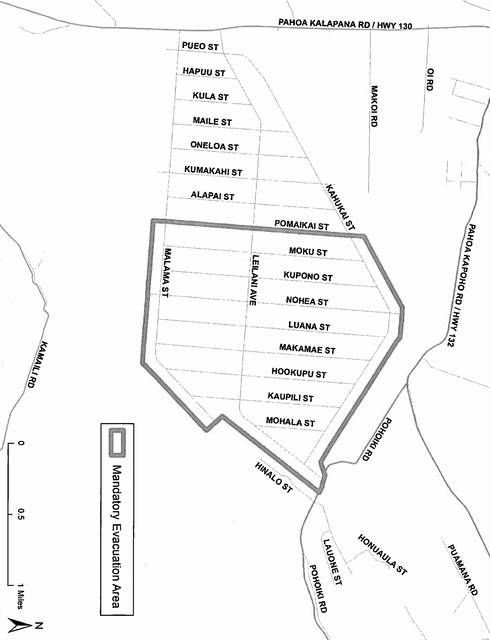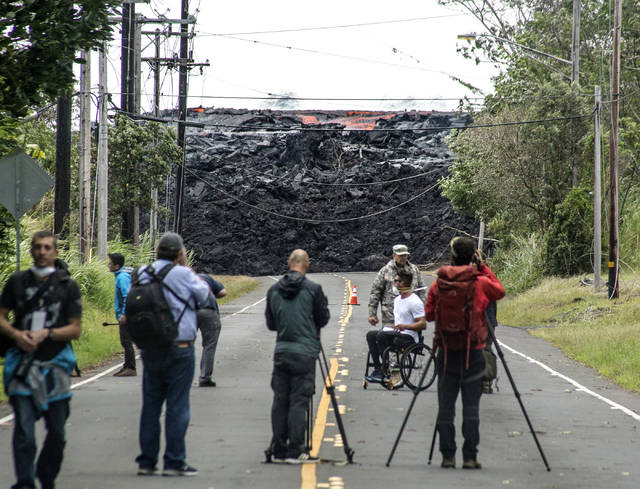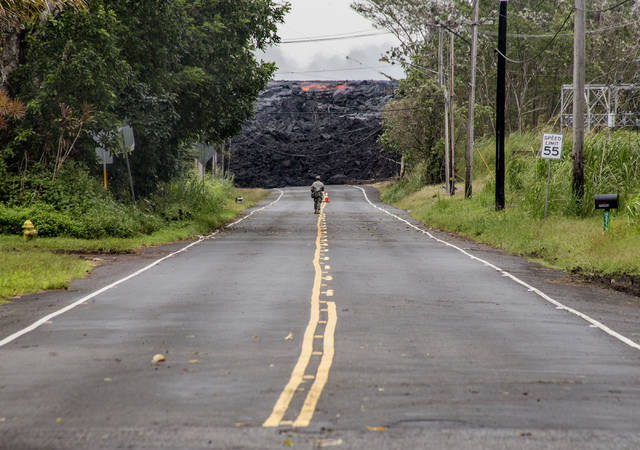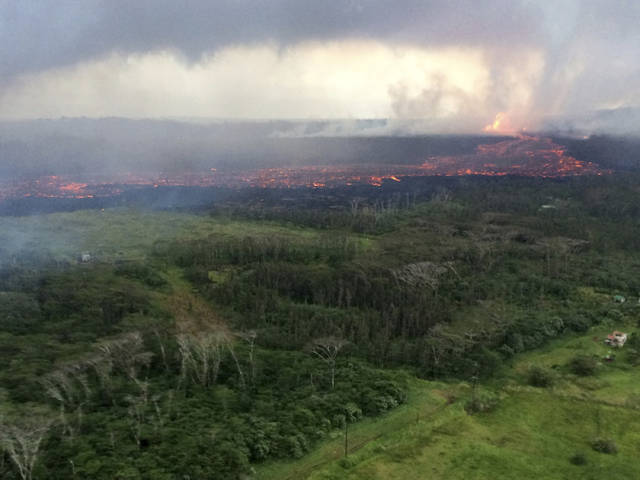Safety an ‘overriding concern’ as residents near active fissures given deadline to leave




Lava flows from fissure 8 near Pahoa on Wednesday. (U.S. Geological Survey/via AP)
HILO — Leilani Estates residents who are closest to the erupting fissures have until about noon today to leave or possibly face arrest.
HILO — Leilani Estates residents who are closest to the erupting fissures have until about noon today to leave or possibly face arrest.
Mayor Harry Kim issued the mandatory evacuation order Thursday for the area east of Pomaikai Street in the subdivision, much of which has been devastated by lava during the past month.
Kim couldn’t be reached for comment by deadline, but Janet Snyder, spokeswoman for the Mayor’s Office, said those who remain past that deadline could be arrested. Asked if police will go house-to-house, she replied, “We’re hoping it doesn’t come to that.”
The order was the first time the county, which has allowed residents to come and go during certain hours, turned up the heat on people trying to ride out the eruption, which began May 3 in Leilani. The rest of the subdivision is considered a voluntary evacuation area and is not affected by that order.
Snyder said a concern is that rescue efforts put emergency responders at risk, particularly if residents wait until the last minute to leave, though she said the order wasn’t in response to any single incident. Those who are rescued in the closed area could be liable for expenses and face arrest.
The order also states that those who stay do so at “their own risk with the knowledge that first responders may not respond.”
Snyder said Kim’s “overriding concern” is the safety of residents and first responders. She said the county hopes those in that area listen to “common sense.” It was unknown how many still reside there.
“Refusal to evacuate may put you, the rest of your family and first responders in danger,” she said. “So we’re asking everyone in the area to comply with the order.”
Jay Turkovsky, a Leilani resident who lives toward the north end of Moku Street inside the mandatory evacuation area, said he plans to stay despite the order. He said he will leave if lava approaches his property and doesn’t think he’ll be putting anyone else at risk because he doesn’t intend to call for help if that time arrives.
“I don’t have any plan on calling them,” Turkovsky said. “I’d be out of there before we are at risk.”
He considers his home to be on safer ground since it’s uphill of the ongoing eruption. Turkovsky, who is president of the Leilani Community Association, said he wants the freedom to come and go.
“Leave us alone and we will survive,” he said.
Turkovsky estimated 30 to 40 people still reside in the entire subdivision. About 2,500 people have been displaced by the ongoing eruption on Kilauea’s East Rift Zone.
Kim also issued an emergency rule for Kapoho Beach Lots, Vacationland and Kapoho Farm Lots that says only residents will be allowed into that area. There is no curfew or additional restrictions in place.
Residents there were advised to evacuate early Wednesday morning as lava began threatening the “Four Corners” area, where Highway 132, Highway 137 and Government Beach Road intersect. As of Thursday afternoon, lava was 1.9 miles from that intersection.
The order doesn’t state penalties, but a section in the Hawaii Revised Statutes covering emergency management says anyone violating a rule of the governor or mayor would be guilty of a misdemeanor that’s punishable by a fine up to $5,000, a year in jail, or both.
Hawaii County Prosecutor Mitch Roth said that’s a larger fine than most misdemeanors.
He said exceptions to the requirement of a warrant to arrest someone in their own home “can be made for reasons of exigency,” meaning a situation calling for immediate action, in a declared state of emergency.
“With fast-moving lava bearing down on someone’s home, police can remove an individual from the home, and arrest them, if need be,” Roth said. “Think about it. Those who refuse to leave and have to be taken from their homes involuntarily are putting first responders, whether it be police, fire, National Guard or Public Works, at increased risk for their lives and safety.”
Andrea Freeman, who teaches constitutional law at the University of Hawaii at Manoa, said emergency situations in the past, including Hurricanes Katrina and Harvey, have resulted in arrests for refusing to evacuate.
“Normally, constitutional law can’t be used to stop something from being done; it can only be used to challenge it in the courts later,” Freeman said.
Roth said the order is different from other evacuation statements, which have been called “mandatory” even if residents are allowed to return, because police, fire and National Guard personnel now are having to go door-to-door to get people out of their homes and putting their own lives at risk.
“What the mayor is basically saying is that those who refuse to leave are responsible for their own safety,” he said.
Email Tom Callis at tcallis@hawaiitribune-herald.com.
Email John Burnett at jburnett@hawaiitribune-herald.com.


